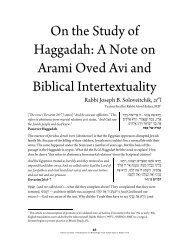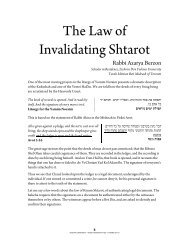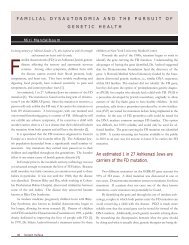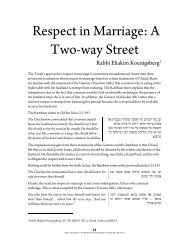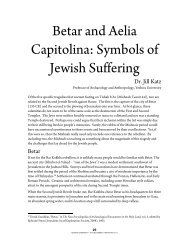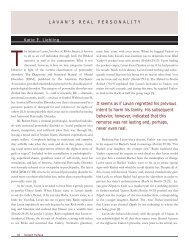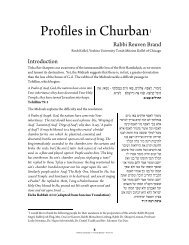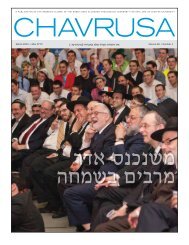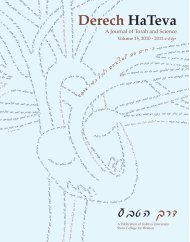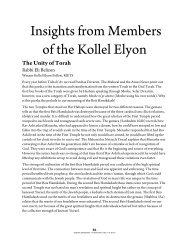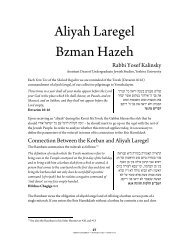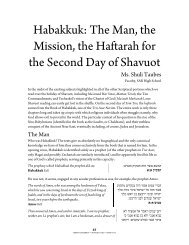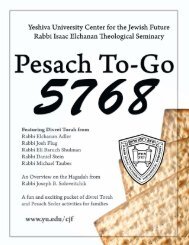YESHIVA UNIVERSITY • SUKKOT TO-GO ... - YU Torah Online
YESHIVA UNIVERSITY • SUKKOT TO-GO ... - YU Torah Online
YESHIVA UNIVERSITY • SUKKOT TO-GO ... - YU Torah Online
You also want an ePaper? Increase the reach of your titles
YUMPU automatically turns print PDFs into web optimized ePapers that Google loves.
the case of a traveler for a “reshut” where the complete ארבג רוטפ is lacking, the exemption is<br />
limited to the obligation to obtain the object of the mitzvah, but does not extend to the act of<br />
dwelling in the Succah. Hence, the non-mitzvah traveler will only be required to dwell in the<br />
Succah should he find one readily accessible 4 .<br />
The principle that “one dwells in his Succah just as he would dwell in his home” applies to the<br />
non-mitzvah traveler on the road. This principle applies whenever the individual would<br />
normally leave his home to embark on a journey for whatever the purpose. The strict opinion<br />
taken by a number of Poskim [see Shut Yechaveh Da’at, 3:47] with regards to tourists, who travel<br />
on Chol HaMoed for pleasure, is not reflected in the approach we have taken in the<br />
understanding of this sugya.<br />
Succah and Yishuv Eretz Yisrael<br />
We find two mitzvot in the <strong>Torah</strong> which are defined by the act of dwelling (“yeshiva”), dwelling<br />
in the Land of Israel (yeshiva b’Eretz Yisrael), and dwelling in the Succah (yeshiva b’succah).<br />
The similarity between the two extends beyond the basic obligation of an act of dwelling; a<br />
certain quality of “yeshiva” is required.<br />
As a general rule, we are obligated in mitzvot despite the difficulties and hardships one must face<br />
in their fulfillment. Yet, in the case of the obligation to live in Eretz Yisrael, we find a number of<br />
exemptions that result from adverse conditions, such as eking out a living, finding a marriage<br />
partner or a <strong>Torah</strong> teacher, and the inability to honor one’s elderly parents who cannot settle in<br />
Israel. It seems that the mere act of dwelling in the Land is insufficient to fulfill this<br />
commandment. A particular quality of “yeshiva” is necessary. The dwelling must lend itself to<br />
joy and contentment.<br />
With regard to the command to dwell in a Succah, we find a similar phenomenon. רוטפ רעטצמה<br />
הכוסה ןמ. One who suffers from discomfiture is exempt from this mitzvah. Apparently the quality<br />
of “yeshiva” required is one of contentment conducive to joy.<br />
Both these mitzvot of dwelling require joy and contentment not merely to beautify the mitzvah,<br />
but as part of their very nature. We would suggest that in both cases the essence and goal of the<br />
mitzvah is a close relationship to Shechina. The Land of Israel is the Land of Shechina. And the<br />
schach under which one dwells in his Succah represents the protection of the Shechina. It is for<br />
this reason that the Zohar calls the shade provided by the schach אתונמיהמד אליצ, symbolic of the<br />
clouds of honor that protected the people of Israel in the wilderness.<br />
4 The Levush (Levush HaChur, OC 640:8) rules that travelers are only obligated at night if they reach a place where<br />
a succah already stands. According to the Levush the traveler need not build a succah, "because there is no greater<br />
trouble and pain than this, to obligate him to build a succah in the field or amongst the gentiles." The view of the<br />
Levush should not be identified with that of the Meiri. Whereas the Levush is operating with the concept of<br />
"mitzta'er," the discomfort exemption, the Meiri is not. The Meiri integrates the Halacha of the traveler with that of<br />
one who is on his way to perform a mitzvah and compares the two “peturim”. For the Levush, the question will be<br />
“what constitutes "mitzta'er"? This question is irrelevant to the Meiri.<br />
14<br />
<strong>YESHIVA</strong> <strong>UNIVERSITY</strong> <strong>•</strong> <strong>SUKKOT</strong> <strong>TO</strong>-<strong>GO</strong> <strong>•</strong> TISHREI 5771



